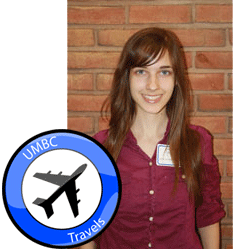Major: English
“St. Cuthbert and Pilgrimage 664-2012 AD: The Heritage of the Patron Saint of Northumbria”

The purpose of this research is to shed light upon pilgrimage during the Middle Ages, a time when arduous journeys were a part of daily life. This study concerns both the literal and figurative aspects of pilgrimage during the Middle Ages, as well as the cultural significance of St. Cuthbert, patron saint of Northumbria. St. Cuthbert, a seventh-century saint, was himself a traveler whose shrine at Lindisfarne was and is a popular pilgrimage site. This research will focus primarily on the travels of St. Cuthbert across Northumbria, in particular his journey from Melrose, Scotland to Lindisfarne, England. This journey has become known as St. Cuthbert’s Way and has been traveled by pilgrims from its inception to the present day. During the summer of 2012, my research will bring me to St. Cuthbert’s Way so I can elucidate the cultural heritage of St. Cuthbert to an audience unfamiliar with pilgrimage during the Middle Ages. St. Cuthbert, as a saint who has drawn pilgrims to Lindisfarne from the seventh to the twenty-first century, offers a window to understanding both medieval and contemporary perceptions of pilgrimage. In addition to researching secondary sources on medieval travel, such as those reflected in illuminated manuscripts of St. Cuthbert’s Life, my observations will include interviews and photographs. The final essay will focus on medieval and modern cultural ideas of pilgrimage. The imprint of St. Cuthbert upon Northern England is just as vibrant as it was in the seventh century—for 1300 years St. Cuthbert has drawn pilgrims to his shrine in Lindisfarne and will continue to do so, for the significance of pilgrimage and travel is just as relevant and meaningful today as it was in the Middle Ages.
How did you find your mentor for your research project?
My mentor, Dr. Gail Orgelfinger, was my professor for a Spring 2012 Honors Independent Study. She encouraged me to develop a research project as a part of the course, and to apply for the URA.
How did you know this was the project you wanted to do?
I am very interested in medieval studies, so I knew the perfect project would be incorporating my interests in British literature and history. With these things in mind, my research became about pilgrimage during the Middle Ages, in particular about St. Cuthbert and his association with the abbeys at Melrose, Scotland and Lindisfarne, England.
Is this your first independent research project?
Yes.
Do you get course credit for this work?
Yes, the URA is part of my independent study from Spring 2012.
How much time do you put into it?
I am not sure if I can count the hours! My time has truly been filled with study, editing papers, and planning my research in England.
How did you hear about the Undergraduate Research Award (URA) program?
I heard about it from my sister Allison, who graduated from UMBC in 2010.
What academic background did you have before you applied for the URA?
Junior status at UMBC and several classes focusing on the medieval period.
Was the application difficult to do?
The application was simple enough, save for making the statement of purpose concise and understandable. I had a difficult time putting my project in a short statement. Though overall, it is a simple application.
How much did your mentor help you with the application?
Dr. Gail Orgelfinger was very kind to edit my abstract several times.
What has been the hardest part about your research?
The most difficult part has certainly been trying to narrow down my subject and realize that I can neither understand nor cover everything I would have liked to have covered. Also, planning my trip along St. Cuthbert’s Way has posed many challenges and surprises. Although I would say that planning my research was more difficult than executing it, as I greatly enjoyed traveling through the English and Scottish countryside, visiting the abbeys, and interviewing people about my research topic.
What was the most unexpected thing?
The most unexpected thing about my research was uncovering all of the information about St. Cuthbert in Northumbria and the Scottish Borders, and how there is more relevance of pilgrimage in our times than I would have expected. While executing my research in Britain this summer, I was also surprised to see how much religious history has infiltrated contemporary culture.
How does your research relate to your work in other classes?
This project fits perfectly in my studies of religious history and pilgrimage literature.
What is your advice to other students about getting involved in research?
The opportunity to do research is something unique to UMBC. This is one of the reasons that I decided to transfer to UMBC from HCC, because it is not easy for an undergraduate to do this kind of research at any university. If you are prepared for editing papers, sleepless nights spent researching, and carrying hoards of books out of the UMBC library, then you are more than ready for a rewarding research project. I am grateful to have received the URA in order to travel to England to study what I love; it is an opportunity that should not be ignored by any serious student at UMBC.
What are your career goals?
My goal is to be a university professor, editor, and writer.
Did you transfer to UMBC from another institution? Where?
I transferred to UMBC in 2010 after taking my freshman year at Howard Community College, in Columbia, MD.
5/18/2023